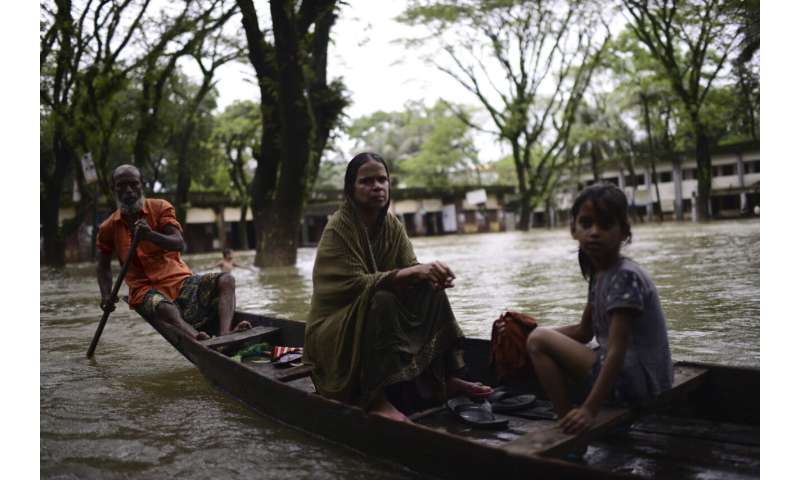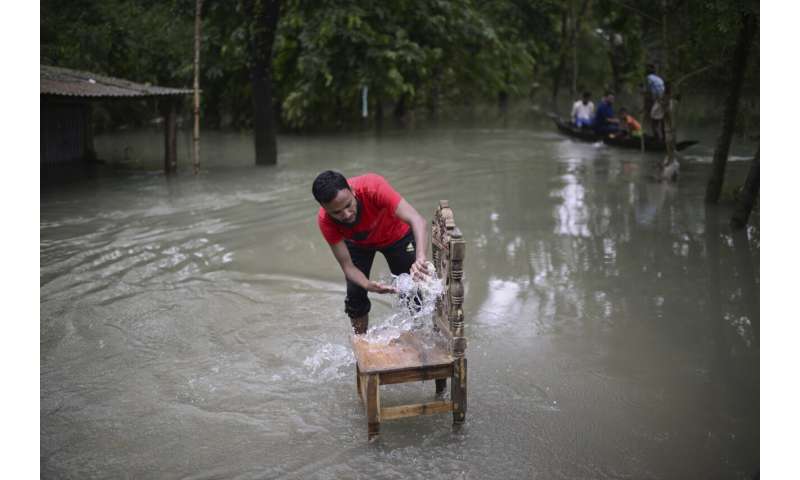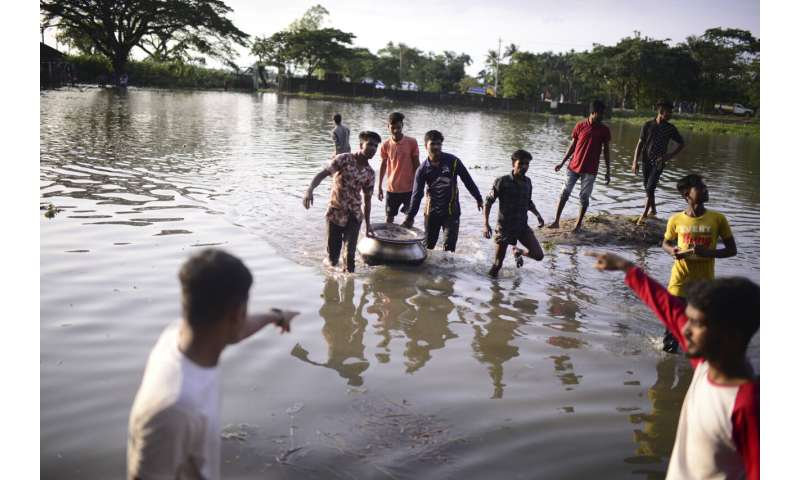Climate change a factor in ‘unprecedented’ South Asia floods
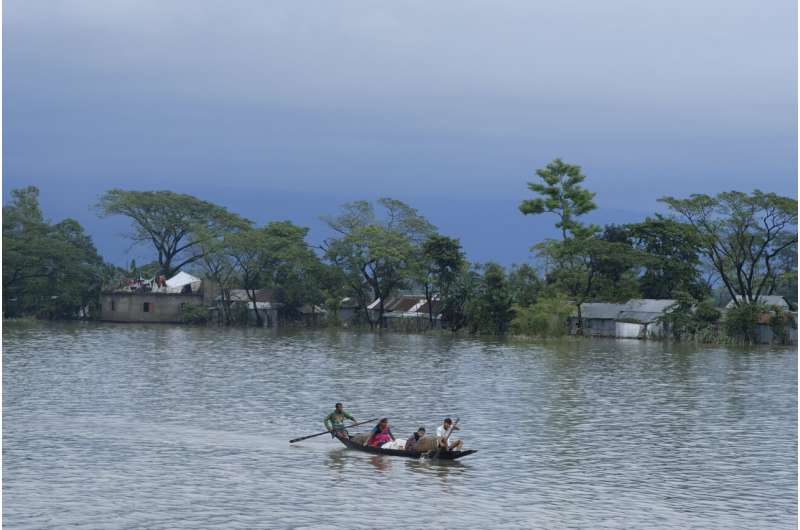
Scientists say climate change is a factor behind the erratic and early rains that triggered unprecedented floods in Bangladesh and northeastern India, killing dozens and making lives miserable for millions of others.
Although the region is no stranger to flooding, it typically takes place later in the year when monsoon rains are well underway.
This year’s torrential rainfall lashed the area as early as March. It may take much longer to determine the extent to which climate change played a role in the floods, but scientists say that it has made the monsoon—a seasonable change in weather usually associated with strong rains—more variable over the past decades. This means that much of the rain expected to fall in a year is arriving in a space of weeks.
The northeastern Indian state of Meghalaya received nearly three times its average June rainfall in just the first three weeks of the month, and neighboring Assam received twice its monthly average in the same period. Several rivers, including one of Asia’s largest, flow downstream from the two states into the Bay of Bengal in low-lying Bangladesh, a densely populated delta nation.
With more rainfall predicted over the next five days, Bangladesh’s Flood Forecast and Warning Centre warned Tuesday that water levels would remain dangerously high in the country’s northern regions.
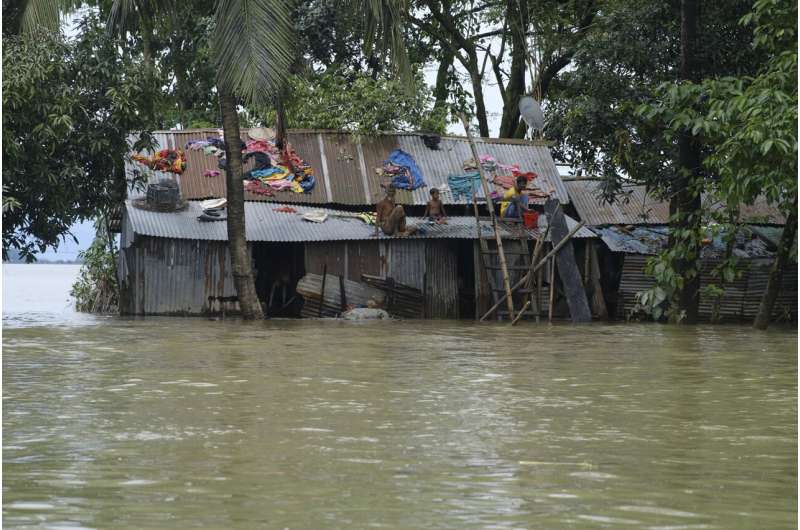
The pattern of monsoons, vital for the agrarian economies of India and Bangladesh, has been shifting since the 1950s, with longer dry spells interspersed with heavy rain, said Roxy Matthew Koll, a climate scientist at the Indian Institute of Tropical Meteorology in Pune, adding that extreme rainfall events were also projected to increase.
Until now, floods in northwestern Bangladesh were rare while Assam state, famed for its tea cultivation, usually coped with floods later in the year during the usual monsoon season. The sheer volume of early rain this year that lashed the region in just a few weeks makes the current floods an “unprecedented” situation, said Anjal Prakash, a research director at India’s Bharti Institute of Public Policy, who has contributed to U.N.-sponsored study on global warming.
“This is something that we have never heard of and never seen,” he said.
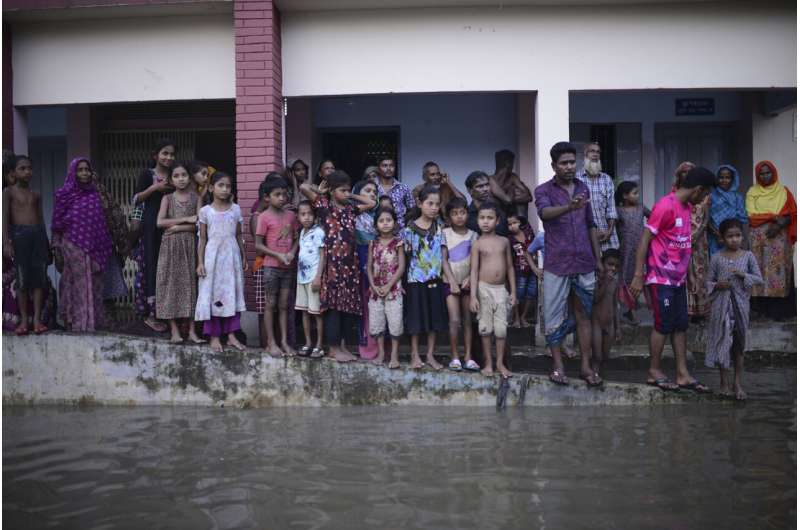
A total of 36 people died in Bangladesh since May 17 while Indian authorities reported that flood deaths have risen to 78 in Assam state, with 17 others killed in landslides.
Hundreds of thousands are displaced and millions in the region have been forced to scramble to makeshift evacuation centers.
Some, like Mohammad Rashiq Ahamed, a shop owner in Sylhet, the hardest-hit city in northeastern Bangladesh, have worriedly returned home with their families to see what can be salvaged. Wading through knee-deep water, he said that he was worried about floodwaters rising again. “The weather is changing .. .there can be another disaster, at any time.”
He is one of about 3.5 million Bangladeshis who face the same predicament each year when rivers flood, according to a 2015 analysis by the World Bank Institute.
-
![Climate change a factor in 'unprecedented' South Asia floods]()
People on a country boat move through flood waters in Sylhet, Bangladesh, Tuesday, June 21, 2022. Villagers in northeastern Bangladesh are crowding makeshift refugee centers and scrambling to meet boats arriving with food and fresh water as massive floods, which have killed dozens of people and displaced hundreds of thousands. Credit: AP Photo/Mahmud Hossain Opu
-
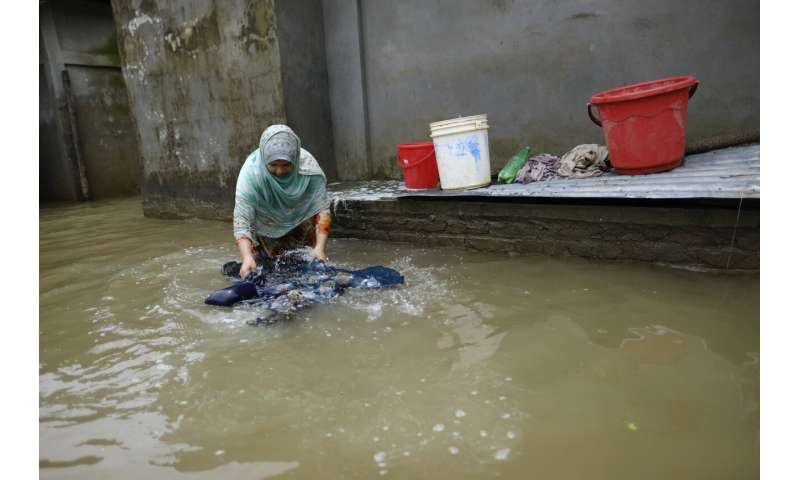
A woman washes clothes in flood waters in Sylhet, Bangladesh, Tuesday, June 21, 2022. Villagers in northeastern Bangladesh are crowding makeshift refugee centers and scrambling to meet boats arriving with food and fresh water as massive floods, which have killed dozens of people and displaced hundreds of thousands. Credit: AP Photo/Mahmud Hossain Opu
-
![Climate change a factor in 'unprecedented' South Asia floods]()
A man washes a wooden chair in flood waters in Sylhet, Bangladesh, Tuesday, June 21, 2022. Villagers in northeastern Bangladesh are crowding makeshift refugee centers and scrambling to meet boats arriving with food and fresh water as massive floods, which have killed dozens of people and displaced hundreds of thousands. Credit: AP Photo/Mahmud Hossain Opu
-
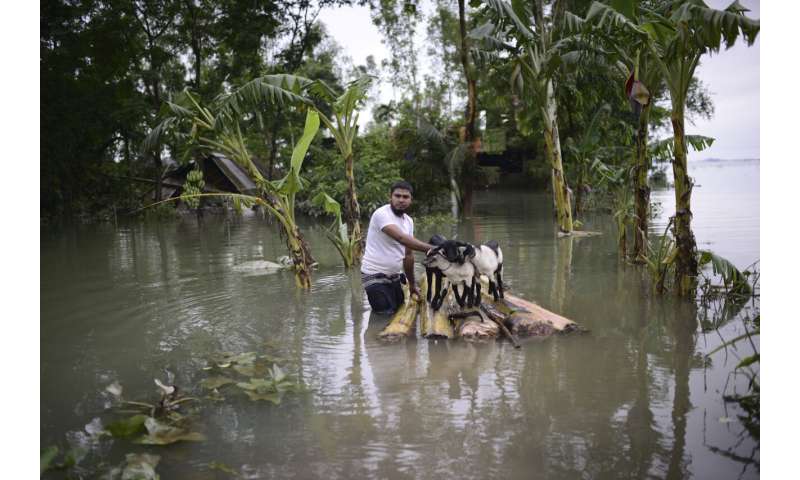
A man uses banana plants for floatation as he transports his goats through flood waters in Sylhet, Bangladesh, Tuesday, June 21, 2022. Villagers in northeastern Bangladesh are crowding makeshift refugee centers and scrambling to meet boats arriving with food and fresh water as massive floods, which have killed dozens of people and displaced hundreds of thousands. Credit: AP Photo/Mahmud Hossain Opu
-
![Climate change a factor in 'unprecedented' South Asia floods]()
People walk through flood waters in Sunamganj, Bangladesh, Tuesday, June 21, 2022. Villagers in northeastern Bangladesh are crowding makeshift refugee centers and scrambling to meet boats arriving with food and fresh water as massive floods, which have killed dozens of people and displaced hundreds of thousands. Credit: AP Photo/Mahmud Hossain Opu
The country of 160 million is considered one of the most vulnerable to climate change and the poor are disproportionately impacted.
Mohammad Arfanuzzaman, a climate change expert at the U.N. Food and Agriculture Organization, said that catastrophic floods like the one this year could have wide-ranging impacts, from farmers losing their crops and being trapped in a cycle of debt to children not being able to go to school and at increased risk to disease.
“Poor people are suffering a lot from the ongoing flooding,” he said.
26 more dead in India monsoon fury, waters recede in Bangladesh
© 2022 The Associated Press. All rights reserved. This material may not be published, broadcast, rewritten or redistributed without permission.
Citation:
Climate change a factor in ‘unprecedented’ South Asia floods (2022, June 22)
retrieved 22 June 2022
from https://phys.org/news/2022-06-climate-factor-unprecedented-south-asia.html
This document is subject to copyright. Apart from any fair dealing for the purpose of private study or research, no
part may be reproduced without the written permission. The content is provided for information purposes only.
For all the latest Science News Click Here
For the latest news and updates, follow us on Google News.


